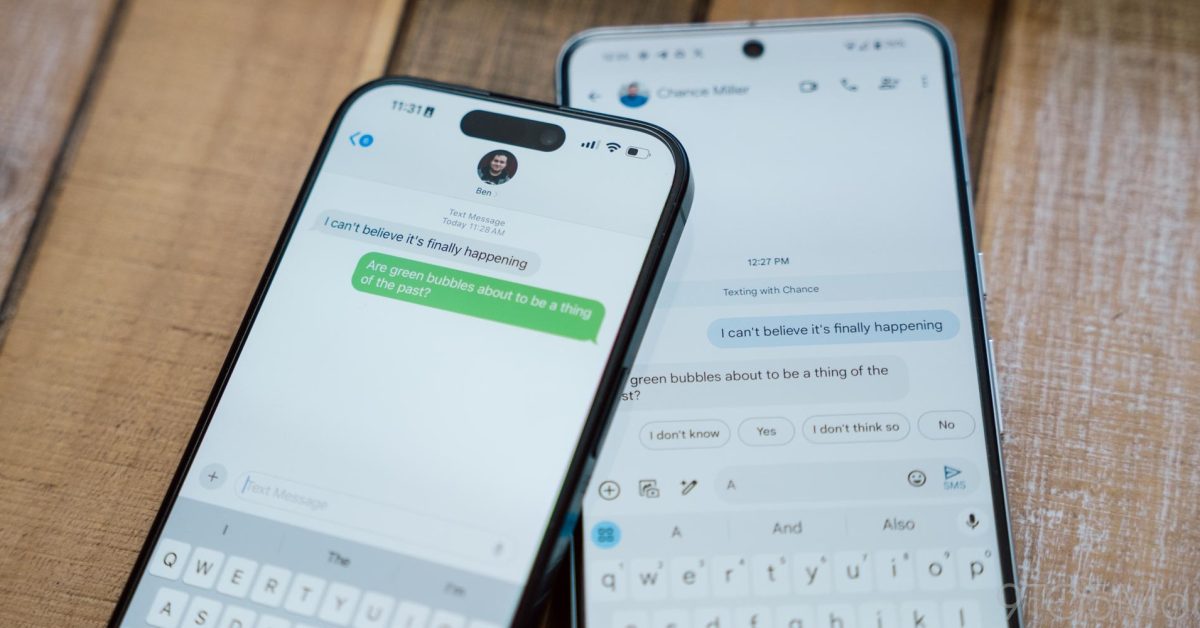In a surprising move, Apple has announced today that it will adopt the RCS (Rich Communication Services) messaging standard. The feature will launch via a software update “later next year” and bring a wide range of iMessage-style features to messaging between iPhone and Android users.
Apple’s decision comes amid pressure from regulators and competitors like Google and Samsung. It also comes as RCS has continued to develop and become a more mature platform than it once was.



RCS is an open standard that states to be formalized over ten years ago, and was planned to replace SMS. However, SMS is a service offered by the cell network providers, so these were addressed to get together and implement it in all networks, so everyone can reliably use it, just like SMS works everywhere. it’s not a feature of phone or OS manufacturers. They simply use the SMS protocol that is already available in the network implementation.
Sadly, the big network providers have failed to reach a consensus on if and when and how to implement RCS. Some say they simply had nothing to gain from it, and I believe they might be right. So they dragged their feet so long that Apple implemented iMessage to offer more features. Google held out longer waiting for the providers, but ultimately gave up as well and implemented their own messaging solution. And while the implementation is proprietary, it’s still based on the open RCS standard, unlike the fully closed iMessage protocol and implementation. This means that as long Apple supports the RCS standard, it matters little to the end user if they build their own proprietary implementation. Google and Apple will be able to talk to each other via RCS. So why is it still not great, even if everyone will be able to use RCS this way?
Well, look a bit further. Any non-Android and non-Apple phone will not be able to participate unless they submit to Google it Apple. No more indie phones with truly independent RCS. The services are also owned and controlled by Google and Apple, two companies that are notoriously resistant to regulations. Unlike cell network providers, which are under comparatively strict federal regulatory control, and even international treaties on minimal requirements for consumer protection. They are well supervised and have to adhere to high security and privacy standards. It’s definitely not perfect, but the current development is much worse. With RCS, it’s now two global supranational companies that will handle your private communications, and history has shown that they are much less worried about adhering to local national laws.
Ok, so the gist of this that I’m getting is that there is an genuinely open RCS standard, but no one has implemented it. Instead, Google has their thing that’s been modified for their benefit at the expense of consumer privacy, and that Apple seems to be making their own similar version. So RCS itself isn’t bad, but it’s being ruined by bad actors, and as of yet there are no good actors.
Pretty much. RCS just defines the protocol. That is basically how messages are formatted, how recipients and senders are labeled, how timestamps are formatted, how messages are compressed, transferred and possibly stored and resent in case of inability to deliver (e.g. recipients phone is off) and a lot more technical stuff.
To use this, you need a network of servers that can actually receive messages from phones/ cell network, then possibly transfer them to a server/ cell tower near the recipient(s) to have it broadcast there, making sure only the intended recipient can decrypt it, and possibly storing it for an unknown duration and a number of attempts to deliver it if the recipient is unreachable. And possibly sending a receipt or failure-to-deliver message back to the sender as well. And all of this has to work reliably 24/7, because people will not accept downtimes.
And then you also need client software on the phones to send/receive messages using the RCS protocol as well, hopefully handling true e2e encryption as well.
It’s a lot of hardware and software engineering to actuallyimplement such a seemingly fundamental standard.